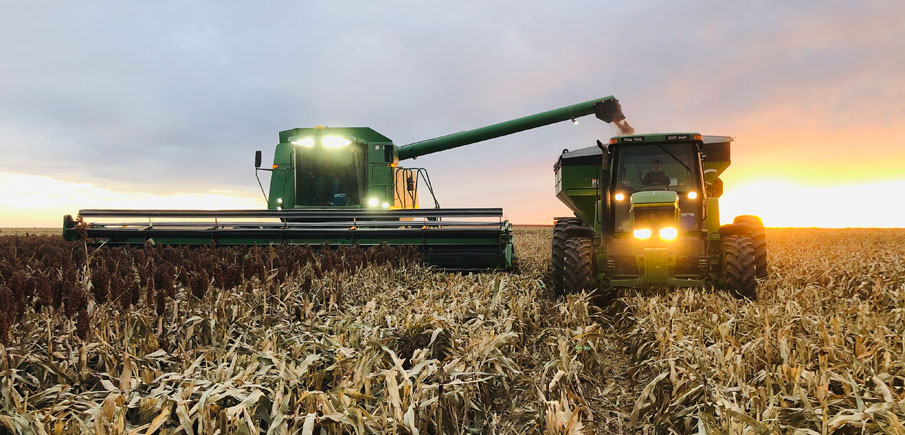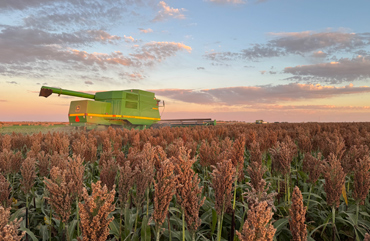Who We Are
Casey Farms was established in 1878 in the Corning Township, Rooks County, Kansas. We are a family farming operation driven by six generations of hard work. Our goal is to be good stewards of the land.
North Central Kansas is a semi-arid climate. With only twenty-two inches of rainfall annually, we are a dryland farming operation. Our primary crops are hard red winter wheat and grain sorghum. We have raised a limited number of soybean and corn acres. We also raise triticale, oats, millet, and other forages. Those secondary crops are used to support our stocker cattle operation.

Our Farming and Ranching Operation
We strive to find better ways to improve our farming practices through continued education and experience. Farming is ever evolving. For the last 100+ years we have advanced from mechanical tillage to no-til practices and are already embracing the future of farming, including technology that focuses on an acre-by-acre approach or even more granular.
Cattle Operations
Our family farm focuses on a background operation that takes light-weight stockers (500-600 lbs.) and places them on grass. The goal is to add pounds to the animals over the summer months and prepare them for the next phase, which is feedlot operations. This is an essential part of the beef supply chain. Our goal is to raise high quality beef, protect cattle health and welfare, and create an outstanding product for global consumers.
Crop Production
Kansas is known as the "breadbasket of the world". Our family farm has produced world-class wheat for nearly 150 years. Spring crops focus on grain sorghum, corn, soybeans. We also raise triticale, oats, millet, and other forages. Those secondary crops are used to support our stocker cattle operation.
Land Stewardship
Land management is our single most important priority. We utilize no-till practices on our sorghum, corn, and soybean acres. This ensures minimal erosion and runoff. In addition, we frequently sample soil to ensure proper nutrients and fertility. In years when soil moisture is available, we use cover crops. In addition, we have won two local soil conservation awards and value our finite water resources.
Weather
Kansas is known for having a variable climate. A typical day includes a heavy dose of sunshine and wind. Summers can be very warm, and winters can be very cold. Temperature fluctuations are normal, and spring/fall can transition quickly. The variability of weather makes all aspects of agriculture challenging, especially the last few years where drought has been a factor. Farming and ranching in Kansas has always been about dealing with adversity.
YEAR ESTABLISHED
YEARS OF EXPERIENCE
FARM GENERATIONS
SOIL CONSERVATION AWARDS
Latest New from Our Blog

Grain Without a Buyer
As the 2025 harvest season unfolds across North Central Kansas, farmers are facing a perfect storm of economic and environmental pressures. From soaring input and volatile markets, it has been nothing short of challenging. To compound problem President Trump’s administration has engaged in a trade war with China – the largest export partner of the United States. The standoff between the countries has impacted the agriculture sector – with major reduction in sorghum and soybean exports. The impact of rural communities and farmers is real.

Bushels and Beyond: The Year Corn Broke the Charts
Corn production for grain is forecast at 16.7 billion bushels, up 13 percent from 2024, which if realized would be the highest production for grain on record for the United States. Based on conditions as of August 1, the yield is forecast at a record high of 188.8 bushels per acre, up 9.5 bushels from last year’s 179.3 bushels. Total planted area, at 97.3 million acres, is up 2 percent from the previous estimate and up 7 percent from the previous year. Is this the year that corn broke the charts?
Nephew Nate Matlack joins the Chiefs
Nate Matlack joins the Kansas City Chiefs in a story that blends grit with professional ambition. Nate Matlack, my nephew, officially joined the Kansas City Chiefs earlier this week, a moment thats as thrilling for our family. Go Chiefs!